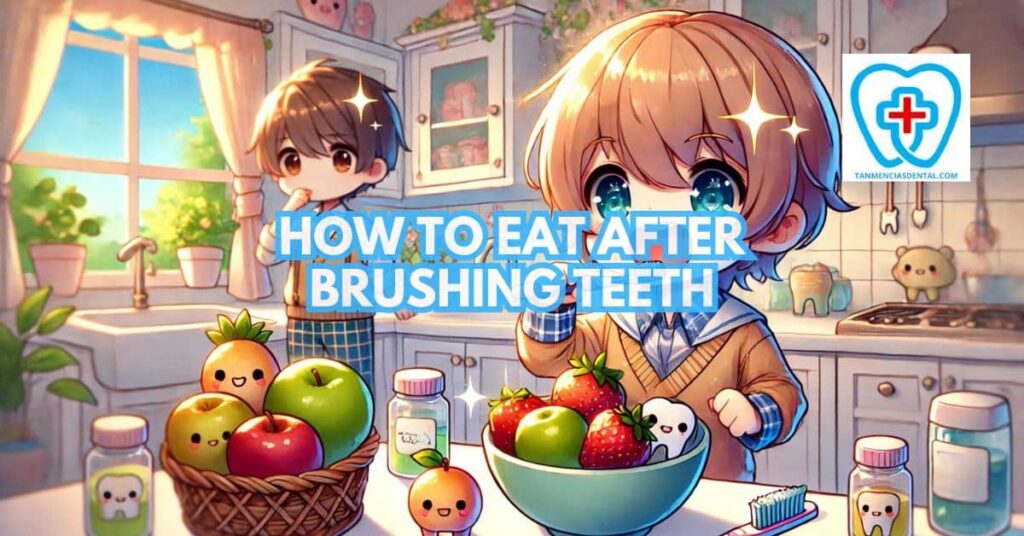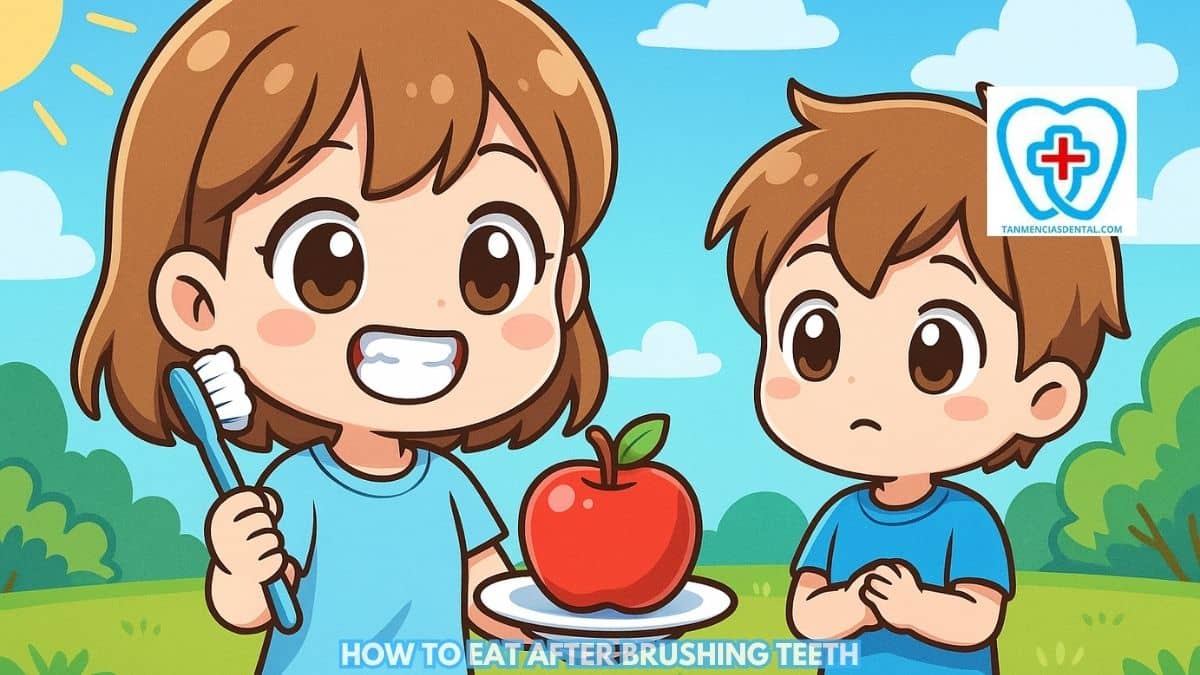Learning how to eat after brushing teeth is an important part of keeping your mouth healthy.
Brushing helps remove food and bacteria, but what you eat and when you eat afterward also affect your teeth.
Eating too soon after brushing can reduce the benefits of fluoride and weaken your enamel.
Knowing when and what to eat helps protect your teeth from acid and decay.
We’ll explain simple ways to care for your teeth by making smart food choices after brushing.
1. The Importance of Waiting After Brushing
It is important to understand why you need to wait before eating after brushing your teeth.
Dentists recommend that you wait to eat after brushing for at least 30 minutes so the fluoride from toothpaste can strengthen your enamel.
If you eat or drink too soon, the fluoride coating on your teeth can be washed away before it has time to protect them.
Knowing how long you should wait helps prevent tooth damage caused by acids and bacteria in food.
This waiting period also allows your saliva to balance the acids in your mouth and begin repairing enamel naturally.
People who eat right away after brushing may weaken their teeth without realizing it.
By making a habit of waiting before eating, you give your teeth the best chance to stay strong and healthy.
Understanding the need to wait helps you keep your mouth cleaner and your enamel more resistant to decay.
🦷 How to Get Plaque Off Your Teeth With Braces
2. Best Time to Brush: Before or After Breakfast
Brushing your teeth before eating helps protect your mouth from the acids and sugars in food that can harm enamel.
When you brush first, fluoride from the toothpaste coats your teeth and forms a shield that keeps bacteria from growing.
If you choose to brush after breakfast, it is important not to start eating immediately after brushing.
You should wait about 30 to 60 minutes to let your saliva neutralize acids and allow enamel to harden again.
This pause prevents damage that can happen when food acids mix with toothpaste residue on softened enamel.
People who brush right before eating are less likely to face enamel erosion or sensitivity later in the day.
Knowing when to brush helps you keep your teeth strong and reduces the chance of long-term dental problems.
🦷 Exploring the Benefits of Angled Toothbrushes
3. Fluoride’s Protective Role and Brushing
Fluoride plays a key role in protecting your teeth by strengthening enamel and preventing decay.
After brushing, fluoride remains on your teeth, continuing to work against bacteria and acid erosion.
Allowing fluoride time to work enhances your enamel’s resilience and reduces the risk of cavities.
This is why delaying eating after brushing is beneficial; it ensures fluoride can do its job effectively.
Understanding fluoride’s role emphasizes the importance of timing your meals carefully.
🦷 What Makes the Best Teeth Whitening Courses Stand Out from Others?
4. Enamel Sensitivity After Brushing
Brushing your teeth too hard or using toothpaste with rough particles can make tooth enamel weaker for a short time.
When enamel becomes sensitive, it cannot fully protect your teeth from hot, cold, or acidic foods and drinks.
Right after brushing, your enamel is softer, so eating or drinking anything acidic or sugary can harm it more easily.
Waiting at least 30 minutes before eating or drinking gives saliva time to restore minerals and strengthen the enamel.
If you eat too soon, acids in food can wear away the surface of tooth enamel and make your teeth more sensitive.
Choosing gentle toothpaste and brushing with a soft-bristled toothbrush helps protect enamel and prevent irritation.
Caring for your enamel each day keeps your teeth strong and reduces the risk of long-term sensitivity.
🦷 How to Reduce the Swelling After Wisdom Teeth Removal

5. Saliva’s Healing Power After Brushing
Saliva is an essential part of oral health because it helps to neutralize acids and repair enamel.
After brushing, saliva plays a role in washing away food particles and bacteria, keeping your mouth clean.
Waiting to eat allows saliva to work effectively, aiding in the healing and strengthening of enamel.
Saliva also contains minerals like calcium and phosphate, which are important for maintaining strong teeth.
Encouraging saliva flow by waiting to eat supports your teeth’s natural defenses.
🦷 What Is the Best Way to Brush Your Teeth with Braces?
6. Tooth-Friendly Food Choices
Choosing the right foods after brushing can help maintain the health of your teeth.
Opt for foods like cheese, yogurt, and leafy greens, which are rich in calcium and support enamel strength.
Crunchy fruits and vegetables, such as apples and carrots, can also help clean teeth and stimulate saliva production.
Incorporating these foods into your diet helps reinforce the protective effects of fluoride and overall oral hygiene.
A balanced diet with these choices contributes to long-term dental health.
🦷 What are Some Surprising Natural Ways to Treat Gingivitis?
7. Foods to Avoid or Limit After Brushing
Certain foods can be harmful to your teeth, especially after brushing.
Acidic foods and drinks, such as citrus fruits and soda, can erode enamel if consumed too often.
Sugary and sticky foods like candy and dried fruits can promote bacterial growth and cavities.
Limiting these foods ensures that the benefits of brushing are preserved, protecting your teeth from potential damage.
Being mindful of these choices helps maintain the effectiveness of your oral care routine.
🦷 Dangers of Electric Toothbrushes: Are They Worth the Hype?
8. Hydration Is Key After Brushing
Drinking water after brushing is a simple way to support your oral health.
Water helps rinse away any remaining toothpaste residue and bacteria, keeping your mouth fresh and clean.
Staying hydrated also promotes saliva production, which is essential for neutralizing acids and protecting enamel.
Water is a tooth-friendly choice that doesn’t contain sugars or acids, making it the best option for oral care.
Prioritizing hydration aids in maintaining a healthy and balanced mouth environment.
🦷 Special Needs And Dental Checkups
9. Snack Smart: Choosing Healthy Options
Snacking can be part of a healthy diet if you choose tooth-friendly options.
Opt for snacks like nuts, seeds, and cheese, which are low in sugar and provide essential nutrients for teeth.
Crunchy vegetables such as celery and carrots are excellent choices that help clean teeth and stimulate saliva production.
These snacks offer nutritional benefits without compromising your oral health.
Making smart snack choices helps maintain the protective benefits of brushing and supports overall dental well-being.
🦷 How Recycled Toothbrushes Support Zero-Waste Lifestyle Goals
10. Mindful Eating Habits for Healthy Teeth
Practicing mindful eating can significantly impact your dental health.
Chewing slowly and thoroughly helps break down food and stimulates saliva, aiding digestion and oral hygiene.
Being aware of portion sizes and food choices can reduce the intake of harmful sugars and acids.
Avoiding frequent snacking and sipping on sugary drinks throughout the day minimizes the risk of tooth decay.
By cultivating mindful eating habits, you can protect your teeth and enhance your overall health.
🦷 Endodontic And Periodontal Treatment in Marikina
11. Consult Your Dentist for Personalized Advice
Your dentist can help you understand the best ways to care for your teeth based on your specific oral health needs.
Regular dental visits allow your dentist to check for plaque buildup and early signs of tooth decay or gum disease.
If you have sensitive teeth, your dentist can recommend a gentle toothpaste or other products that reduce discomfort.
They can also teach you proper brushing and flossing habits to prevent enamel wear and protect your gums.
During checkups, your dentist may clean areas you cannot reach at home, removing plaque that can lead to cavities.
They can offer advice on foods and drinks that support strong enamel and prevent irritation for sensitive teeth.
Professional guidance also helps you understand how often you should visit for cleaning and preventive care.
By working closely with your dentist, you can maintain healthy teeth, avoid gum disease, and keep your smile strong for years.
🦷 Dentist Serving the Marikina Area
👨⚕️ Conclusion
Understanding how to eat after brushing your teeth is key to maintaining long-term oral health.
By making informed choices and following best practices, you can protect your teeth and ensure their strength and vitality.
Choosing tooth-friendly foods, staying hydrated, and practicing mindful eating all contribute to a healthy smile.
With the right habits, you can enjoy meals without compromising your oral hygiene.
Prioritizing these practices helps keep your teeth healthy and your smile bright for years to come.
😊 Self-Promotion
Experience exceptional dental care at Tan-Mencias Dental Clinic, conveniently located in Parang, Marikina City.
Our friendly and skilled team is dedicated to providing you with the best oral health services in a comfortable and welcoming environment.
Whether you have questions or want to schedule an appointment, feel free to reach out to us.
You can get in touch with us via phone at 0917-145-1074, via Facebook message, or via our website’s contact form.
We look forward to helping you achieve a healthy, beautiful smile!
❔ FAQs
1. Can I eat right after brushing my teeth?
It is best to wait at least 30 minutes before eating after brushing.
This gives fluoride time to protect your enamel and lets your saliva balance the acids in your mouth.
Eating too soon can wash away fluoride and weaken your teeth over time.
2. Is it better to brush before or after breakfast?
Brushing before breakfast is the safer choice because it removes bacteria that build up overnight.
It also coats your teeth with fluoride, which helps protect them from acids in food.
If you prefer brushing after breakfast, wait about 30 to 60 minutes first.
3. What foods are good to eat after brushing?
Tooth-friendly foods include yogurt, cheese, eggs, and leafy greens.
Crunchy fruits and vegetables like apples and carrots help clean your teeth and stimulate saliva.
These foods are gentle on enamel and support long-term dental health.
4. Which foods should I avoid right after brushing?
Avoid acidic foods like citrus fruits and soda, as well as sugary snacks such as candy or dried fruit.
These can damage enamel and encourage bacterial growth when your teeth are still sensitive after brushing.
5. Why is saliva important after brushing?
Saliva helps protect your teeth by washing away acids and bacteria.
It also adds minerals that keep enamel strong.
Waiting before eating allows saliva to do its job and helps your mouth stay balanced and healthy.

